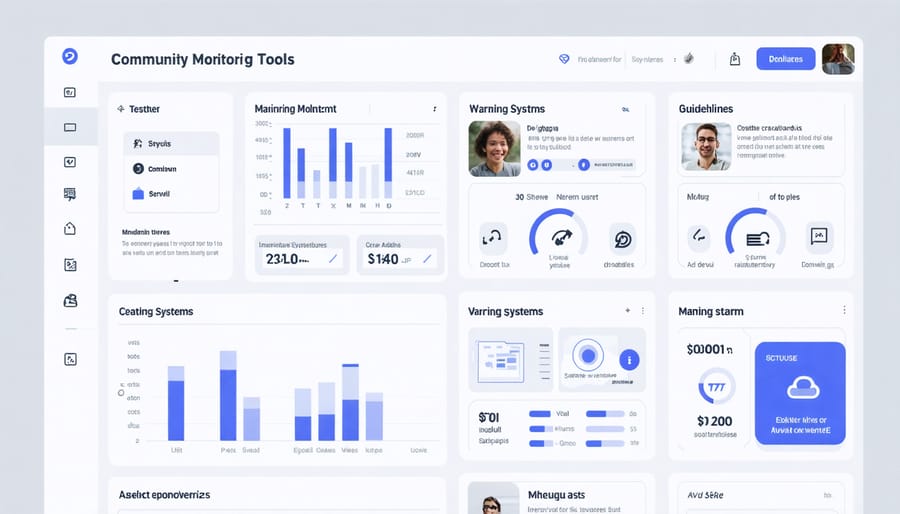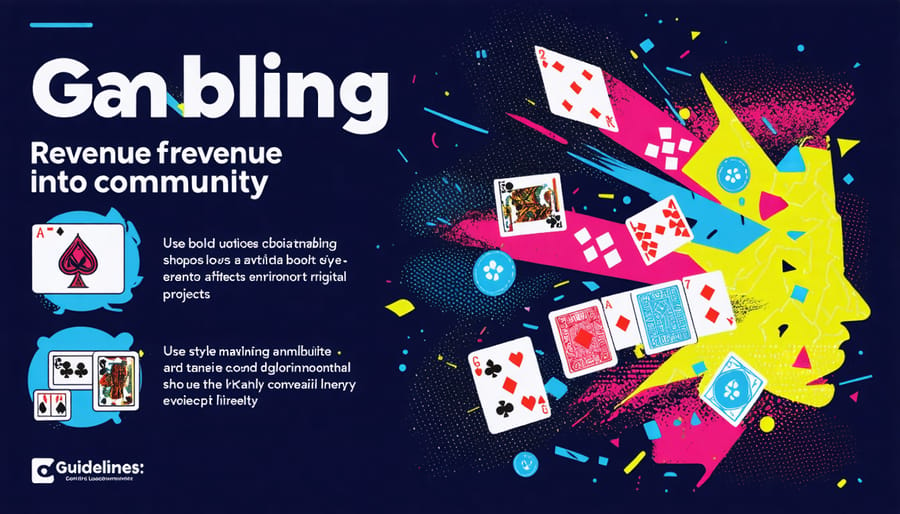Building resilient communities through ethical gambling practices requires a delicate balance of personal responsibility and collective action. When implemented thoughtfully, Moonbet casino and similar platforms can contribute to sustainable community development while protecting vulnerable populations.
Local initiatives that combine gambling harm reduction with environmental stewardship are reshaping how Canadian communities approach responsible gaming. By integrating financial literacy programs, mental health support, and sustainable development goals, forward-thinking municipalities are creating comprehensive frameworks that benefit both residents and the environment.
The key lies in fostering partnerships between gaming operators, community organizations, and environmental groups. These collaborations enable communities to channel a portion of gambling revenues into green initiatives, creating a virtuous cycle where responsible gaming directly supports local sustainability projects. From funding community gardens to supporting addiction prevention programs, this integrated approach demonstrates how ethical gambling practices can serve as a catalyst for positive social change.
This community-centered model represents a paradigm shift in how we view gambling’s role in society – not as an isolated activity, but as part of a broader ecosystem of social responsibility and environmental stewardship.
Building a Safety Net Through Community Engagement
Neighborhood Support Networks
Building strong community support networks is essential for promoting responsible gambling practices at the local level. Our neighborhood initiatives bring together trained counselors, recovered individuals, and caring community members to create a supportive environment for those seeking help.
Local support groups meet weekly at community centers, offering both in-person and virtual options to ensure accessibility for all residents. These meetings provide a judgment-free space where participants can share experiences, learn coping strategies, and build meaningful connections with others who understand their challenges.
Prevention programs, led by community volunteers and healthcare professionals, focus on early intervention and education. Through workshops, family support sessions, and peer mentoring, these programs help identify warning signs and provide practical tools for maintaining healthy gambling habits.
The success of these networks relies on collaboration between local businesses, healthcare providers, and community organizations. By working together, we’ve created a comprehensive support system that combines professional expertise with the warmth and understanding of neighborhood connections.

Collaborative Education Initiatives
Community-driven education forms the cornerstone of responsible gambling practices in our neighborhoods. Local organizations have developed innovative programs that bring together diverse stakeholders, from recovered gamblers to mental health professionals, creating a supportive network of knowledge-sharing and support.
These collaborative initiatives include monthly workshops at community centers, where participants learn about healthy gambling boundaries and financial literacy. Peer-support groups meet regularly to share experiences and strategies, while trained facilitators guide discussions on recognizing early warning signs of problem gambling.
Local libraries and recreation centers now offer free resources, including self-assessment tools and educational materials in multiple languages. Youth organizations have also stepped up, developing age-appropriate programs that teach critical thinking skills and responsible decision-making around gambling activities.
The success of these programs lies in their grassroots approach. By involving community members in both planning and implementation, these initiatives remain relevant and culturally sensitive. Regular feedback sessions ensure that educational content evolves to meet changing community needs, while partnerships with local businesses help sustain these valuable programs.
Local Solutions for Responsible Gaming
Community Monitoring Systems
Building effective community monitoring systems starts with creating a network of support that connects local organizations, healthcare providers, and concerned citizens. These systems work like a neighborhood watch for gambling-related concerns, helping identify potential issues before they become serious problems.
A successful monitoring system typically includes regular check-ins at community centers, anonymous reporting channels, and peer support groups. Local organizations can train volunteers to recognize early warning signs of problem gambling, such as changes in social behavior or financial difficulties. These trained community members become vital touchpoints, offering guidance and support when needed.
Many Canadian communities have found success with the “buddy system” approach, where recovered gamblers mentor others who are struggling. This peer-to-peer support creates a sustainable cycle of community care and understanding. Regular community meetings provide safe spaces for open discussions about gambling concerns, while digital platforms enable anonymous reporting and support access.
Local businesses can participate by implementing responsible gaming policies and training staff to recognize signs of distress. Community centers often serve as hubs for information sharing and support group meetings. By maintaining open communication channels between various stakeholders, communities can create a safety net that catches concerns early and provides appropriate intervention when needed.
Remember, the goal isn’t to eliminate gambling entirely but to foster a responsible environment where everyone looks out for each other’s wellbeing.

Local Resource Integration
Building a strong support network for responsible gambling starts right in our own backyard. Many communities already have excellent resources like mental health services, financial counseling, and addiction support groups that can be naturally integrated into online gambling harm reduction efforts.
Local libraries, community centers, and healthcare facilities can serve as information hubs where people can learn about responsible gambling practices and connect with specialized support. These familiar spaces feel more approachable than dedicated gambling services and help reduce the stigma around seeking help.
Consider how the Belleville Community Centre partnered with an online gambling platform to offer free financial literacy workshops. They combined practical money management skills with responsible gambling education, reaching people who might not have sought out gambling-specific resources.
Recreation centers and sports clubs can play a unique role by providing healthy alternative activities and social connections. The Thunder Bay Hockey League, for instance, now includes responsible gambling messaging in their community events, reaching players and families in a natural, non-threatening way.
Faith groups, cultural organizations, and seniors’ centers are also valuable partners in this work. They often have deep community trust and can help identify at-risk individuals early while providing culturally appropriate support. By connecting these existing community pillars with online gambling resources, we create a more comprehensive and accessible support system for everyone.
Environmental Impact and Social Responsibility
Digital Footprint Reduction
When we think about responsible gambling, environmental impact might not be the first thing that comes to mind. However, our digital activities leave a significant carbon footprint, and online gambling is no exception. By adopting ethical gambling practices, our community can help reduce the environmental impact of digital gaming activities.
One effective approach is encouraging players to limit their online gaming sessions to specific times, which naturally reduces energy consumption and server load. Local gaming establishments have found that implementing “green gaming hours” – designated periods when players can enjoy reduced-rate games while using shared resources – helps minimize individual digital footprints.
Many Canadian communities are now promoting shared gaming spaces in community centers, where multiple players can access games using single devices or networks. This communal approach not only builds social connections but also significantly reduces the energy consumption compared to individual home gaming sessions.
Digital gambling platforms in our region are increasingly adopting cloud-based solutions that use renewable energy sources. By choosing these eco-conscious platforms, players can enjoy their gaming while supporting environmentally responsible businesses. Some local organizations have even started tracking and reporting their carbon savings from these initiatives, showing how small changes in gaming habits can lead to meaningful environmental benefits.
Remember, every reduced gaming session means less server energy consumption, lower cooling requirements for data centers, and a smaller carbon footprint for our community.
Social Investment Programs
When communities embrace responsible gambling practices, they create opportunities to reinvest revenues into meaningful environmental projects. Through carefully structured programs, gambling proceeds are channeled into sustainable urban initiatives that benefit everyone.
Local success stories showcase how this approach works. In Burlington, gaming revenues helped establish a community solar garden, providing clean energy while reducing utility costs for residents. Thunder Bay’s innovative “Green Gaming” program funds neighborhood tree-planting initiatives, with over 5,000 trees planted in the past year alone.
These investments create a positive feedback loop: as communities see tangible benefits from regulated gambling, support for responsible gaming practices grows. Environmental projects funded through gaming revenues often involve youth organizations and community volunteers, fostering a deeper connection between residents and their neighborhood’s well-being.
Partnership programs between casinos and local environmental groups have proven particularly effective. The “Play Green” initiative in Halifax demonstrates how gaming venues can become environmental stewards, funding everything from watershed protection to urban farming projects.
By linking gambling revenues to environmental improvements, communities transform what some view as a challenging activity into a catalyst for positive change. This approach ensures that gaming benefits extend beyond individual players to enhance the entire community’s quality of life.

As we’ve explored throughout this article, creating ethical gambling practices isn’t just about individual responsibility – it’s about coming together as a community to foster positive change. When neighbors, local organizations, and businesses unite around responsible gambling initiatives, we create a safety net that benefits everyone.
The success stories we’ve seen in communities across Canada show that grassroots involvement makes a real difference. From peer support groups to community education programs, these local efforts help create a more sustainable gambling environment that protects vulnerable individuals while respecting personal choice.
Looking ahead, we must continue strengthening these community bonds. Consider joining local advocacy groups, participating in awareness campaigns, or volunteering with organizations that promote responsible gambling. Every small action contributes to building a more resilient community framework around ethical gambling practices.
Remember that sustainable gambling practices go hand in hand with other community wellness initiatives. When we work together to promote responsible gaming, we’re also supporting mental health, financial literacy, and social connection – all crucial elements of a thriving community.
Let’s commit to maintaining open dialogue about gambling in our communities, supporting those who need help, and celebrating the positive steps we’re taking together. Through continued collaboration and mutual support, we can create a future where online gambling enhances rather than diminishes our community’s wellbeing.
